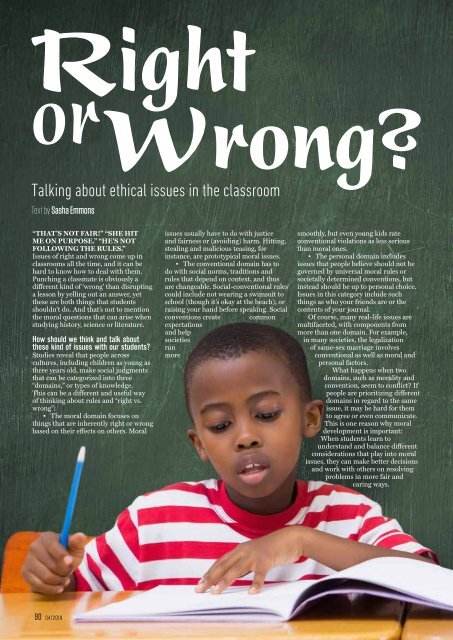Oi Magazine reviews - Aura & Co. Infrared Sauna Studio,Thao Dien... "Heavenly Heat"
Create successful ePaper yourself
Turn your PDF publications into a flip-book with our unique Google optimized e-Paper software.
Talking about ethical issues in the classroom<br />
Text by Sasha Emmons<br />
“THAT’S NOT FAIR!” “SHE HIT<br />
ME ON PURPOSE.” “HE’S NOT<br />
FOLLOWING THE RULES.”<br />
Issues of right and wrong come up in<br />
classrooms all the time, and it can be<br />
hard to know how to deal with them.<br />
Punching a classmate is obviously a<br />
different kind of ‘wrong’ than disrupting<br />
a lesson by yelling out an answer, yet<br />
these are both things that students<br />
shouldn’t do. And that’s not to mention<br />
the moral questions that can arise when<br />
studying history, science or literature.<br />
How should we think and talk about<br />
these kind of issues with our students?<br />
Studies reveal that people across<br />
cultures, including children as young as<br />
three years old, make social judgments<br />
that can be categorized into three<br />
“domains,” or types of knowledge.<br />
This can be a different and useful way<br />
of thinking about rules and “right vs.<br />
wrong”:<br />
• The moral domain focuses on<br />
things that are inherently right or wrong<br />
based on their effects on others. Moral<br />
issues usually have to do with justice<br />
and fairness or (avoiding) harm. Hitting,<br />
stealing and malicious teasing, for<br />
instance, are prototypical moral issues.<br />
• The conventional domain has to<br />
do with social norms, traditions and<br />
rules that depend on context, and thus<br />
are changeable. Social-conventional rules<br />
could include not wearing a swimsuit to<br />
school (though it’s okay at the beach), or<br />
raising your hand before speaking. Social<br />
conventions create common<br />
expectations<br />
and help<br />
societies<br />
run<br />
more<br />
smoothly, but even young kids rate<br />
conventional violations as less serious<br />
than moral ones.<br />
• The personal domain includes<br />
issues that people believe should not be<br />
governed by universal moral rules or<br />
societally determined conventions, but<br />
instead should be up to personal choice.<br />
Issues in this category include such<br />
things as who your friends are or the<br />
contents of your journal.<br />
Of course, many real-life issues are<br />
multifaceted, with components from<br />
more than one domain. For example,<br />
in many societies, the legalization<br />
of same-sex marriage involves<br />
conventional as well as moral and<br />
personal factors.<br />
What happens when two<br />
domains, such as morality and<br />
convention, seem to conflict? If<br />
people are prioritizing different<br />
domains in regard to the same<br />
issue, it may be hard for them<br />
to agree or even communicate.<br />
This is one reason why moral<br />
development is important:<br />
When students learn to<br />
understand and balance different<br />
considerations that play into moral<br />
issues, they can make better decisions<br />
and work with others on resolving<br />
problems in more fair and<br />
caring ways.<br />
90 04/2018





